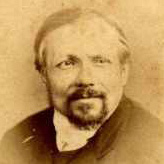George Dornbusch
The full resource is FREE to all registered users of the website
If you are not already registered you can sign up for FREE website access to download the full resource.

- Born: 1820
- Died: 1873
- Occupation: Businessman
- Claim to fame: A male campaigner active in the early suffrage movement
George was born in Trieste, Austria, and moved to England in 1845, becoming a successful merchant – so successful that he survived an ‘assassination’ attempt by a jealous business rival! George settled in London with his first wife and their daughter, Ada, in a house they named ‘Vegetarian Cottage’, reflecting the family’s commitment to and involvement with the early vegetarian movement in London. Vegetarianism was considered an ‘eccentricity’ at this time. After his first wife died, George married his second wife and former housekeeper Emma, who, along with his daughter Ada, signed the women’s suffrage petition at their home in Grove Villas, South Hackney, London in 1866.
George was described variously as ‘eccentric’, ‘a German communist’ and ‘a most unsafe, excitable person’ with some noticeable physical ‘deformities’. However, he was also acknowledged as a good-hearted philanthropist, concerned with improving people’s living conditions, health and sanitation, as well as being involved in the anti-slavery and peace movements. In 1863, George was a member of the general committee of the anti-slavery Emancipation Society, along with John Stuart Mill, who handed the 1866 women’s suffrage petition to Parliament, and Dr Richard Pankhurst, the husband of later WSPU founder Emmeline Pankhurst. In 1867, George was a member of the National Society for Women’s Suffrage and, from 1871 until his death in 1873, a member of the Central Committee of the National Society for Women’s Suffrage.
Not much else is known about George but he represents one of the many men who were supporters of and active in the suffrage campaign. Often these men were mocked by their peers and treated badly, but they stood by their convictions and often their wives and daughters for the campaign.
Glossary
- Assassination – the murder of someone famous or important
- Eccentricity – someone eccentric is considered strange or unusual, sometimes in a humorous way
- Philanthropist – a person who helps the poor, especially by giving them money
- Emancipation – the process of giving people social or political freedom and rights
Questions
- Why is it important that men were involved with suffrage campaigns as well as women?
- Do you think there are any reasons why suffrage campaigners were often involved with a number of social campaigns?
- What does George’s story tell us about the suffrage campaigners in the nineteenth century?
